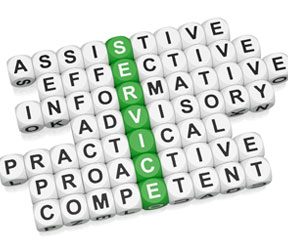SMBs looking to managed services providers to deliver efficiency, innovation and more.
 As the role of business technology steadily evolves, small to midsize businesses (SMBs) have become increasingly comfortable with a managed services approach to their technology requirements. Organizations that once turned to outside help only for occasional project support now see ongoing managed services arrangements as a way to control spending, efficiently allocate limited resources and access advanced expertise in the latest technologies.
As the role of business technology steadily evolves, small to midsize businesses (SMBs) have become increasingly comfortable with a managed services approach to their technology requirements. Organizations that once turned to outside help only for occasional project support now see ongoing managed services arrangements as a way to control spending, efficiently allocate limited resources and access advanced expertise in the latest technologies.
Industry surveys illustrate that a growing number of smaller businesses are working with managed services providers (MSPs) to achieve both cost savings and business growth. According to MSPmentor, more than 70 percent of SMBs outsource parts of their IT infrastructure, up from just 12 percent in 2011. In a new Microsoft survey of 1,700 small, midsize and large organizations, 74 percent reported that managed services had enabled them improve their overall product and service quality.
Demonstrated top- and bottom-line benefits are driving this shift.
In a recent survey of SMB technology buyers in the U.S., TechAisle found that 54 percent reported improved bottom-line benefits through reduced IT costs. In addition, they said that managed services give them greater control over the IT environment, allow them to maintain a leaner business, and make costs, performance and the user experience more predictable.
Almost half (46 percent) said that managed services contribute to business growth through faster resolution of IT issues. SMBs are able to increase revenue by optimizing system availability and performance, enhancing productivity and enabling staff to focus on core competencies.
Focused Resources
TechAisle notes that MSPs play an increasingly important role for SMBs because they directly address key business and IT challenges. For instance, SMBs are looking to roll out new applications and services to support digital transformation initiatives, but they typically lack the manpower and resources necessary. Day-to-day tasks often overwhelm in-house IT staff, preventing businesses from adequately linking their IT operations with business processes. MSPs facilitate digital transformation by bringing experience and manpower to bear on high-priority initiatives.
Analysts say the MSP model works for SMBs primarily because organizations understand that technology is an important business driver, but they lack the resources to keep up with the latest trends. In fact, smaller organizations may not actually have a dedicated technology team. In many cases, IT responsibilities simply fall to the employees with the most technical knowledge. The unintended consequence is that when employees are distracted from their core areas of expertise to work on technical tasks, it slows productivity and prevents the business from being able to grow.
A collaborative arrangement with an MSP lets key people focus on primary responsibilities. What’s more, many recurring network issues will be corrected when these tasks are properly managed and IT infrastructure is properly monitored. The TechAisle survey found that managed services helped companies boost revenue through optimized productivity and reduced downtime.
According to CompTIA, network monitoring, backup and recovery, email hosting, customer relationship management (CRM) applications, and storage are among the functions commonly turned over to providers. However, MSP can also help drive leading-edge technologies into the business, allowing employees to further enhance their efficiency and productivity. MSPs have the focus and expertise to introduce their customers to emerging technologies such as cloud, mobile and analytics solutions.
Access to Expertise
Cloud-based solutions and services are becoming a particularly important element of the managed services portfolio. In a recent Frost & Sullivan survey, 52 percent of IT decision-makers cited a lack of in-house expertise as hampering their cloud implementations. One-quarter said that simply keeping up with new technology makes managing their cloud environments difficult. A full 91 percent said they plan to seek cloud implementation assistance,
By serving as “cloud orchestrators,” CompTIA says, MSPs can make it easier for customers to migrate workloads to the cloud, optimize existing cloud services and implement new services such as predictive analytics and data mining.
“Just as they remotely manage on-premises devices and applications, they can manage what a customer has in the cloud,” said Carolyn April, senior director of industry analysis for CompTIA. “It’s a natural spot for an MSP.”
Technology has evolved from a supporting role to become a strategic business driver, capable of delivering a range of cost and operational benefits. However, SMBs must efficiently use their limited resources to realize those benefits. Working with a managed services provider with broad and deep expertise, SMBs can focus resources on high-value projects that increase efficiency, productivity and innovation.




You must be logged in to post a comment.